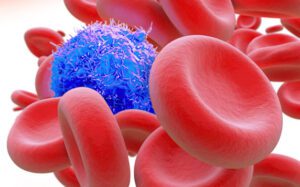
For years, there has been a major unmet need for a more sensitive method for improved identification and characterization of rare circulating tumor cells (CTCs), blood markers that can identify tumors that are metastasizing and spreading.
To address this crucial need, SRI Biosciences acquired scanning instrumentation technology from PARC, a Xerox company, that we are developing into new research applications. This technology, called FASTcell™, can scan whole blood with extremely high speed and sensitivity. Test results can be obtained within minutes for rapid detection and characterization of CTCs. Our vision is to create a product that can detect cancer cells from a simple blood test that can be used for early detection and characterization of biomarkers on CTCs.
The FASTcell technology can analyze all blood cell types at a scanning speed of 25 million cells per minute. This allows cells to be surveyed quickly, increasing the ability to locate rare cells and boosting detection sensitivity when compared to other technologies. FASTcell analysis is now available as a service to researchers and clinicians. FASTcell offers high sensitivity and characterization of CTCs offering advantages over other technologies that can miss these rare cells or have limited ability to characterize CTC biomarkers. SRI’s patented platform permits detailed molecular characterization of all circulating rare cells, including tumor and immune cells.
How FASTcell Works
The service is based on a simple blood test. A blood sample can be rapidly analyzed to detect CTCs. The FASTcell technology applies laser-based techniques to scan broad fields of labeled blood cells immobilized on slides. The cells are then characterized with high sensitivity, using multiplex biomarker imaging developed by SRI scientists. This technology allows up to seven biomarkers to be analyzed simultaneously.
SRI researchers have previously demonstrated the efficacy of FASTcell technology for detection and characterization of breast cancer CTCs. At the recent World CTC conference, we presented research into improvements that increase the sensitivity of detecting lung cancer CTCs with the FASTcell technology.
Our team found that FASTcell is capable of highly sensitive non-small cell lung cancer (NSCLC) CTC detection. We developed an assay using the FAST™ (Fiber-optic Array Scanning Technology) cytometer for the enhanced detection of NSCLC CTCs undergoing epithelial-to-mesenchymal transition (EMT). (EMT is a property of cancer cells that promotes their metastasis and spread.) In this study, we achieved 30 to 50 percent improvements in identifying lung cancer CTCs that would otherwise not be detected by techniques that rely on epithelial markers lost during EMT. We believe that our approach will facilitate future studies of clinical significance by improving the detection of metastatic NSCLC CTCs and salient biomarkers of progression.
The new FASTcell service offers the fastest and most accurate CTC inspection techniques available. Coupled with the ability to identify and capture a single tumor cell from hundreds of millions of normal blood cells, and then characterize it genetically or even sequence its genome, the extreme sensitivity and specificity it provides will give researchers a vital new analytic tool as to better understand the link between CTCs and disease.


